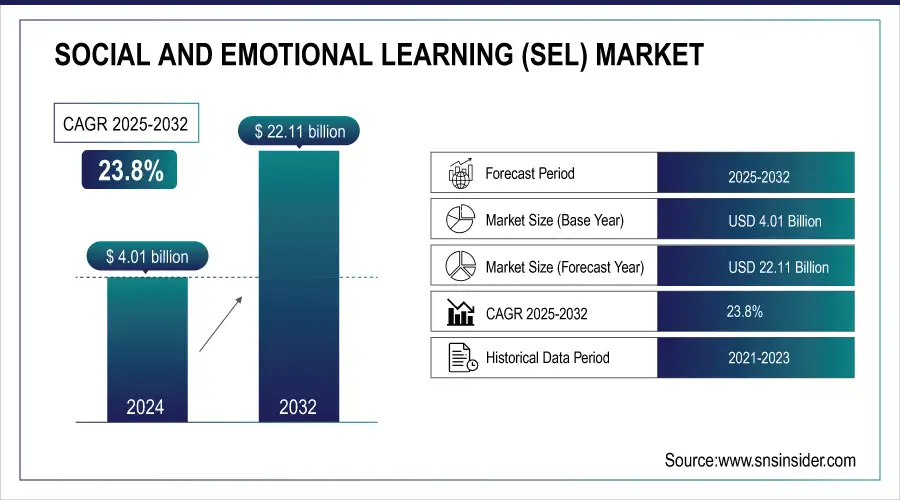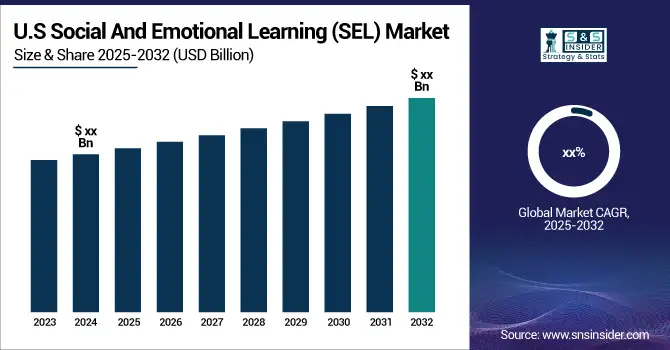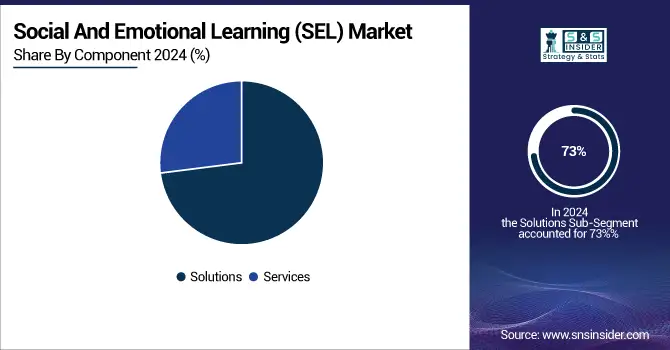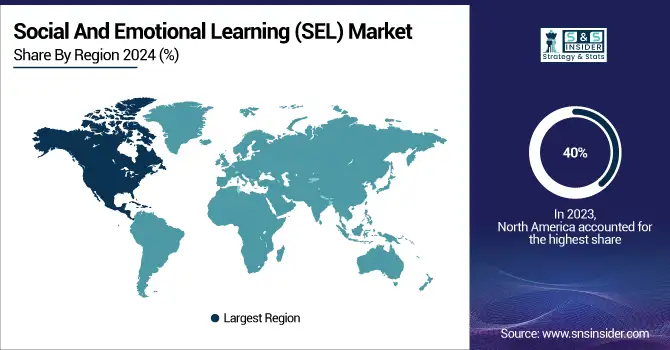Social And Emotional Learning (SEL) Market Report Scope & Overview:
The Social And Emotional Learning (SEL) Market Size was valued at USD 4.01 Billion in 2024 and is expected to reach USD 22.11 Billion by 2032 and grow at a CAGR of 23.8% over the forecast period 2025-2032.

To Get more information on Social And Emotional Learning (SEL) Market - Request Free Sample Report
A market report can include insights beyond market size and CAGR, such as funding trends, adoption rates, policy support, and technological advancements. It can assess student engagement, teacher training participation, and SEL's impact on behavior and academics. Case studies, pilot program results, and demographics of SEL adoption across education and corporate sectors add depth. Additionally, ROI analysis, parental and teacher perceptions, and AI integration in SEL provide valuable insights. These statistics help stakeholders understand market trends, effectiveness, and future growth opportunities, offering a comprehensive view of SEL’s evolving landscape.

Key Trends Shaping the Social and Emotional Learning (SEL) Market
-
Personalized & Adaptive Learning: Increasing adoption of SEL platforms that customize learning experiences based on students’ emotional, social, and behavioral needs.
-
Integration with Academic Curriculum: Schools and educational institutions are embedding SEL programs into standard curricula to improve student engagement, collaboration, and academic outcomes.
-
Digital & Online Platforms: Growth of e-learning tools, apps, and platforms facilitates remote and hybrid SEL delivery, making programs more accessible and scalable.
-
Teacher Training & Professional Development: Expansion of educator-focused SEL training programs enhances teaching effectiveness and promotes consistent implementation of social-emotional strategies.
-
Data-Driven Insights: Use of analytics and AI to assess student progress, behavioral trends, and program effectiveness supports evidence-based decision-making.
-
Government & Policy Support: Rising initiatives and funding from educational authorities drive SEL adoption to improve mental health and holistic student development.
-
Fragmented Competitive Landscape: The market features multiple global and regional SEL providers, leveraging partnerships, content innovation, and technology integration to expand reach.
Social and Emotional Learning (SEL) Market Drivers:
-
Increasing Integration of Digital Tools and AI Enhances Growth in the Social and Emotional Learning (SEL) Market
The growing adoption of AI-driven tools, gamification, and digital SEL platforms is significantly enhancing the effectiveness and scalability of SEL programs. Schools and organizations increasingly leverage cloud-based platforms, mobile applications, and AI-powered analytics to track student progress, personalize learning experiences, and improve engagement. These innovations allow for real-time feedback, interactive learning experiences, and remote accessibility, making SEL more inclusive and adaptable to different learning needs.
Additionally, the integration of virtual reality (VR) and gamified SEL experiences fosters a more engaging approach to emotional intelligence development. As technology continues to advance, the ability to provide data-driven insights, automated assessments, and AI-generated personalized learning paths will further boost SEL adoption across educational institutions, workplaces, and healthcare sectors. This digital transformation is driving significant market expansion, making SEL solutions more accessible, cost-effective, and adaptable to diverse learning environments.
Social and Emotional Learning (SEL) Market Restraints:
-
Limited Awareness and Resistance to Change Restrict Social and Emotional Learning (SEL) Market Expansion
Despite the growing importance of SEL, limited awareness and resistance from traditional educational systems and administrators hinder market growth. Many educators and policymakers prioritize academic performance over social-emotional development, leading to insufficient emphasis on SEL programs. Additionally, some stakeholders lack a clear understanding of SEL’s long-term benefits, making it difficult to secure funding and institutional support.
Moreover, concerns about data privacy, technology integration challenges, and teacher training gaps contribute to hesitancy in implementing SEL solutions. Many institutions also struggle with measuring the direct impact of SEL programs, making it difficult to justify investment. Addressing these concerns through awareness campaigns, government initiatives, and professional development programs is crucial to overcoming this restraint.
Social and Emotional Learning (SEL) Market Opportunities:
-
Rising Government Policies and Funding for SEL Create Lucrative Growth Opportunities in the Market
Governments worldwide are increasingly recognizing the importance of SEL and introducing policies, grants, and funding initiatives to support its integration into educational systems. Many state and federal education policies now mandate SEL incorporation, driving widespread adoption across schools and universities. Funding programs, such as ESSER (Elementary and Secondary School Emergency Relief) funds in the U.S., enable institutions to invest in SEL solutions, training programs, and digital tools.
Additionally, corporate social responsibility (CSR) initiatives and private-sector investments are fueling SEL advancements in both educational and workplace settings. This financial backing allows for the development of more accessible, research-backed, and technology-driven SEL platforms that cater to diverse learning needs. With increasing government and private investments, SEL programs are set to expand beyond traditional K-12 settings into corporate training, mental health support, and community development initiatives, opening new avenues for market growth.
Social and Emotional Learning (SEL) Market Challenges:
-
Ensuring Measurable Outcomes and ROI Remain a Challenge for the Social and Emotional Learning (SEL) Market
The SEL market has difficulty quantifying its direct impact on student performance, mental health, and workplace productivity. Unlike traditional academic subjects, SEL focuses on emotional intelligence, behavioral improvements, and interpersonal skills, which are harder to measure using conventional assessment tools. Many schools and organizations struggle to define clear success metrics for SEL programs, making it difficult to justify continued investment.
Additionally, inconsistent implementation, lack of standardized evaluation frameworks, and limited long-term data create hurdles in proving the effectiveness of SEL initiatives. Stakeholders demand concrete evidence of improved academic performance, workforce productivity, and mental well-being to sustain financial backing and policy support. To overcome this challenge, advanced analytics, AI-driven insights, and longitudinal studies are essential in demonstrating measurable outcomes and return on investment (ROI), ensuring continued market growth and credibility.
Social And Emotional Learning (SEL) Market Segments Analysis
-
By Component, Solutions Segment Dominates SEL Market; Services Segment Projects Highest Growth
In 2024, the Solutions segment dominated the Social and Emotional Learning (SEL) market, accounting for 73% of revenue. This dominance is attributed to the widespread adoption of SEL platforms and assessment tools across educational institutions. For instance, These developments underscore the growing emphasis on integrating digital solutions to foster SEL, reflecting a significant shift towards technology-enhanced learning environments. The substantial revenue share of the Solutions segment highlights the critical role of innovative platforms and tools in promoting SEL across diverse educational settings.
The Services segment is projected to experience the highest Compound Annual Growth Rate (CAGR) of 24.8% during the forecast period. This surge is driven by the increasing demand for consulting, integration, deployment, training, and support services essential for the effective implementation of SEL programs. Educators and administrators recognize the importance of professional development to successfully integrate SEL into curricula. Such initiatives highlight the necessity for comprehensive services that support educators in adopting and sustaining SEL practices. The anticipated growth in the Services segment reflects a broader trend toward investing in the necessary infrastructure and training to ensure the successful adoption of SEL frameworks, thereby enhancing the overall effectiveness of these programs in educational institutions.

-
By End-User, Middle & High Schools Lead SEL Market; Elementary Schools Segment Shows Rapid Growth
In 2024, the Middle & High Schools segment held the largest revenue share of 43% in the Social and Emotional Learning (SEL) market, driven by the increasing need for emotional intelligence development and mental well-being support among adolescents. Middle and high school students face academic pressures, social challenges, and mental health concerns, making SEL programs essential for fostering resilience, self-awareness, and positive decision-making. Companies are expanding their product offerings to cater to this age group.
For example, Newsela launched an SEL-centered curriculum designed for middle and high school students, incorporating real-world scenarios and interactive discussions to build emotional and social competencies. Similarly, Nearpod introduced new immersive lessons that use gamification and virtual reality to enhance SEL engagement among teenagers.
The Elementary Schools segment is projected to grow at the highest CAGR during the forecast period due to the rising awareness of the benefits of early intervention in emotional and social skill development. Early childhood is a crucial period for fostering emotional intelligence, empathy, and conflict-resolution abilities, which SEL programs effectively nurture. Companies are investing in SEL solutions tailored to young learners. These product innovations highlight the growing demand for SEL tools that can be seamlessly integrated into early education curricula. As schools and policymakers recognize the long-term benefits of introducing SEL at a young age, this segment is expected to witness rapid expansion, shaping emotionally intelligent and socially responsible future generations.
-
By Type, Web-Based Solutions Drive SEL Market Growth Amid Digital Learning Adoption
In 2024, the Web-based segment dominated the Social and Emotional Learning (SEL) market, accounting for 54% of total revenue. The increasing preference for online learning platforms, coupled with the accessibility and scalability of web-based SEL solutions, has driven this growth. Schools and educational institutions are prioritizing digital SEL programs that allow students to access resources anytime and from anywhere. Web-based SEL platforms offer interactive lessons, assessments, and real-time progress tracking, making them highly effective for educators and students alike. Companies have been actively enhancing their online offerings to cater to the evolving needs of digital education. These advancements reflect the increasing demand for flexible and data-driven SEL tools that can be implemented across diverse learning environments. The dominance of the web-based segment underscores the shift toward digital-first education strategies, allowing schools to scale SEL initiatives without logistical constraints. As technology continues to shape education, web-based SEL solutions will remain a crucial component in fostering emotional intelligence and resilience in students across various educational settings.
-
By Core Competencies, Self-Management Emerges as Key Competency Driving SEL Market Expansion
In 2024, the Self-Management segment held the largest revenue share of 32% in the Social and Emotional Learning (SEL) market, driven by the growing need for students to develop emotional regulation, goal-setting, and stress management skills. Self-management is a critical SEL core competency that helps students navigate academic challenges, interpersonal relationships, and personal growth. Schools and organizations are integrating self-management-focused SEL programs to equip students with the skills necessary for lifelong success. Companies are actively enhancing their offerings to address this demand. These advancements reflect the increasing emphasis on fostering emotional control and responsible decision-making in students. The dominance of this segment highlights the importance of teaching young individuals how to manage their emotions and behaviors effectively, contributing to improved academic performance and overall well-being. As schools continue to prioritize mental health and social-emotional development, self-management-focused SEL solutions are expected to remain a key driver of growth in the SEL market.
Social and Emotional Learning (SEL) Market Regional Analysis:
-
North America Social and Emotional Learning (SEL) Market Insights
In 2024, North America dominates the Social and Emotional Learning (SEL) Market with an estimated share of 40%, driven by rising adoption of digital SEL platforms, government initiatives promoting emotional intelligence in schools, and increasing awareness of student mental health. The region benefits from well-established education systems, advanced technology integration, and strong investments in teacher training, supporting widespread deployment of SEL solutions that enhance student well-being, social skills, and academic performance.

Get Customized Report as per Your Business Requirement - Enquiry Now
-
United States Leads Social and Emotional Learning (SEL) Market in North America
The United States holds the largest market share in North America due to federal and state-level mandates for SEL integration, extensive funding for school-based programs, and the presence of key SEL solution providers. Initiatives such as nationwide SEL curricula, professional development programs for educators, and research-backed frameworks drive adoption. The U.S. focus on improving student mental health, fostering empathy, and enhancing social competencies positions it as the leading contributor to the North American SEL market.
-
Asia Pacific Social and Emotional Learning (SEL) Market Insights
Asia Pacific is the fastest-growing region with an estimated CAGR of 12% in 2024, fueled by government-backed educational reforms, increasing digital adoption in schools, and rising awareness of mental health among students. Expanding urban school infrastructure, investments in teacher training, and the incorporation of interactive SEL tools accelerate market growth. The region’s emphasis on holistic education and social-emotional development is driving strong demand for SEL platforms, assessments, and professional services.
-
China Leads Social and Emotional Learning (SEL) Market Growth in Asia Pacific
China dominates the Asia Pacific Social and Emotional Learning (SEL) Market due to government initiatives encouraging emotional intelligence development in schools and curriculum reforms integrating SEL frameworks. The growing adoption of technology-enabled SEL tools, mobile learning platforms, and teacher training programs accelerates the implementation of SEL solutions. Chinese policymakers’ focus on reducing student stress, promoting social skills, and enhancing mental well-being supports widespread SEL adoption, making China the key driver of regional growth.
-
Europe Social and Emotional Learning (SEL) Market Insights
In 2024, Europe holds a significant share in the Social and Emotional Learning (SEL) Market, driven by government-mandated educational policies, growing awareness of student mental health, and integration of SEL into national curricula. Investment in digital learning tools, teacher training, and professional development programs supports steady regional growth. Schools and educational institutions are increasingly adopting SEL solutions to enhance social competencies, emotional resilience, and overall student well-being across diverse European countries.
-
United Kingdom Dominates Europe’s Social and Emotional Learning (SEL) Market
The United Kingdom leads Europe due to advanced education policies emphasizing emotional intelligence, government funding for SEL initiatives, and high adoption of technology-driven learning platforms. UK schools prioritize early intervention, teacher training, and evidence-based SEL frameworks to improve student outcomes. The focus on enhancing mental well-being, conflict resolution skills, and social awareness among students reinforces the country’s leadership position within Europe, driving sustained market growth in the SEL sector.
-
Latin America and Middle East & Africa Social and Emotional Learning (SEL) Market Insights
The Social and Emotional Learning (SEL) Market in Latin America and Middle East & Africa is witnessing steady growth, driven by government initiatives promoting emotional intelligence in schools, increasing digital adoption, and rising focus on student mental health. Expansion of SEL solutions, professional development programs for educators, and localized content support broader implementation. Countries in these regions are prioritizing social-emotional skills and well-being, creating strong demand for integrated SEL platforms, training services, and assessment tools to improve academic and emotional outcomes.
-
Regional Leaders in Latin America and Middle East & Africa
Brazil leads Latin America due to government-backed SEL programs, digital learning initiatives, and strong school adoption rates. In the Middle East & Africa, the United Arab Emirates dominates, supported by strategic educational reforms, emphasis on emotional well-being, and investment in modern learning platforms, driving the widespread adoption of Social and Emotional Learning (SEL) solutions across the region.
Competitive Landscape Social and Emotional Learning (SEL) Market:
Panorama Education:
Panorama Education is a leading provider of data-driven social and emotional learning (SEL) solutions for K–12 schools. The company focuses on helping educators collect, analyze, and act on student feedback to improve academic performance, mental well-being, and school climate. By offering survey tools, analytics dashboards, and reporting systems, Panorama enables schools to track SEL competencies, monitor student engagement, and implement targeted interventions. Its solutions support evidence-based decision-making, foster emotional intelligence, and promote inclusive learning environments. Panorama’s role in the SEL market is crucial in enabling schools to integrate social-emotional development into curricula effectively and measurably.
-
In December 2024, Panorama Education expanded its leadership team by appointing Seth Johnson as Chief Client Officer. Johnson brings over 14 years of experience in client success roles and will lead Panorama's client-facing teams to ensure exceptional support and partnership with K-12 schools and districts nationwide.
EVERFI:
EVERFI provides comprehensive digital learning platforms addressing social-emotional learning, financial literacy, health, and safety. Its SEL programs focus on developing skills such as empathy, self-awareness, and responsible decision-making through interactive, scenario-based content. EVERFI partners with schools, districts, and organizations to deliver scalable, engaging, and measurable solutions that support student well-being. By leveraging technology and data analytics, EVERFI helps educators track student progress, identify needs, and implement effective interventions. The company plays a vital role in the SEL market by combining digital innovation with evidence-based curricula, enabling widespread adoption of social and emotional learning practices across diverse educational settings.
-
In August 2023, EVERFI from Blackbaud collaborated with Truth Initiative to launch an updated prescription drug safety curriculum for middle and high school students amid the growing youth overdose crisis.
Social and Emotional Learning (SEL) market Companies:
-
CASEL (Collaborative for Academic, Social, and Emotional Learning)
-
EVERFI
-
Second Step
-
Everyday Speech
-
Social Express (Brighten Learning)
-
Peekapak
-
Mightier
-
ClassDojo
-
Newsela
-
Rethink Ed
-
Playworks
-
Wings of Kids
-
SchoolMint
-
Character.org
-
The SEL Collaborative
-
Edmodo
-
GoNoodle
-
MindUp
| Report Attributes | Details |
|---|---|
| Market Size in 2024 | US$ 4.01 Billion |
| Market Size by 2032 | US$ 22.11 Billion |
| CAGR | CAGR of 23.8 % From 2025 to 2032 |
| Base Year | 2024 |
| Forecast Period | 2025-2032 |
| Historical Data | 2021-2023 |
| Report Scope & Coverage | Market Size, Segments Analysis, Competitive Landscape, Regional Analysis, DROC & SWOT Analysis, Forecast Outlook |
| Key Segments | • By Component (Solutions [Social and Emotional Learning Platform, Social and Emotional Learning Assessment Platform], Services [Consulting, Deployment, and Integration, Training and Support]) • By End-user (Pre-K, Elementary Schools, Middle & High Schools, Corporate) • By Type (Web-based, Application) • By Core Competencies (Self-Awareness, Self-Management, Social Awareness, Relationship Skills, Responsible Decision-Making) |
| Regional Analysis/Coverage | North America (US, Canada), Europe (Germany, UK, France, Italy, Spain, Russia, Poland, Rest of Europe), Asia Pacific (China, India, Japan, South Korea, Australia, ASEAN Countries, Rest of Asia Pacific), Middle East & Africa (UAE, Saudi Arabia, Qatar, South Africa, Rest of Middle East & Africa), Latin America (Brazil, Argentina, Mexico, Colombia, Rest of Latin America). |
| Company Profiles |
Committee for Children, CASEL, EVERFI, Second Step, Everyday Speech, Social Express, Peekapak, Mightier, ClassDojo, Newsela, Panorama Education, Rethink Ed, Playworks, Wings of Kids, SchoolMint, Character.org, The SEL Collaborative, Edmodo, GoNoodle, MindUp |

